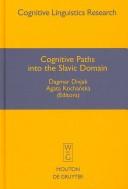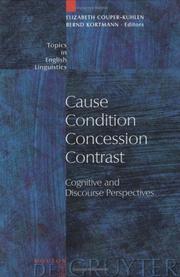| Listing 1 - 10 of 11 | << page >> |
Sort by
|
Multi
ISBN: 9781107118447 9781316339732 9781107544208 1316339734 9781108146135 1443892203 9781443892209 1108145779 1108146627 1443855154 9781443855150 1107118441 1107544203 Year: 2017 Publisher: Cambridge: Cambridge university press,
Abstract | Keywords | Export | Availability | Bookmark
 Loading...
Loading...Choose an application
- Reference Manager
- EndNote
- RefWorks (Direct export to RefWorks)
The best survey of cognitive linguistics available, this Handbook provides a thorough explanation of its rich methodology, key results, and interdisciplinary context. With in-depth coverage of the research questions, basic concepts, and various theoretical approaches, the Handbook addresses newly emerging subfields and shows their contribution to the discipline. The Handbook introduces fields of study that have become central to cognitive linguistics, such as conceptual mappings and construction grammar. It explains all the main areas of linguistic analysis traditionally expected in a full linguistics framework, and includes fields of study such as language acquisition, sociolinguistics, diachronic studies, and corpus linguistics. Setting linguistic facts within the context of many other disciplines, the Handbook will be welcomed by researchers and students in a broad range of disciplines, including linguistics, cognitive science, neuroscience, gesture studies, computational linguistics, and multimodal studies.
Psycholinguistics --- Linguistique cognitive --- Sublanguage --- E-books --- Cognitive grammar. --- Cognitive linguistics --- Grammar, Comparative and general --- Linguistique cognitive. --- Cognitive grammar --- Lexicology. Semantics
Multi
ISBN: 9781107558618 9781107005822 1107005825 9780511794414 9781139128278 1139128272 9781139117616 1139117610 1283342030 9781283342032 051179441X 1107558611 1107221404 1139124838 9786613342034 113912336X 1139113259 1139115448 Year: 2011 Publisher: Cambridge: Cambridge university press,
Abstract | Keywords | Export | Availability | Bookmark
 Loading...
Loading...Choose an application
- Reference Manager
- EndNote
- RefWorks (Direct export to RefWorks)
"The relationship between language and literature is a contentious issue. On the one hand, it may simply be described as a relationship between raw material and a finished product - language provides the basis on which creative and unique works of literature emerge. On the other hand, once we look at meaning, the dividing lines begin to fade - it is difficult to define a sharp boundary separating the meaning of literary works and the meaning of other texts. One way of downplaying the obvious links is to claim that fiction engages knowledge much broader and culturally specific than every-day use of language does. But that would be an exaggeration. One could not follow an ordinary discussion of, say, climate change if one did not have any prior knowledge of the issue"--
Language and languages --- Cognitive grammar. --- Discourse analysis, Literary. --- Style --- Psychological aspects. --- Cognitive grammar --- Discourse analysis, Literary --- 801.56 --- 82-3 --- Foreign languages --- Languages --- Anthropology --- Communication --- Ethnology --- Information theory --- Meaning (Psychology) --- Philology --- Linguistics --- Literary discourse analysis --- Rhetoric --- Literary style --- Cognitive linguistics --- Grammar, Comparative and general --- Psycholinguistics --- 82-3 Proza. Fictie. Narratologie --- Proza. Fictie. Narratologie --- 801.56 Syntaxis. Semantiek --- Syntaxis. Semantiek --- Style&delete& --- Psychological aspects --- Lexicology. Semantics --- Stilistics --- Pragmatics --- 82-3 Fiction. Prose narrative --- Fiction. Prose narrative --- Arts and Humanities --- Language & Linguistics --- Language and languages - Style - Psychological aspects
Multi
ISBN: 9781107017832 1107017831 9781139084727 9781107569300 9781139380225 1139380222 1139084720 9781139377362 1139377361 9781139375931 1139375938 1107230780 9781107230781 1280647655 9781280647659 9786613633705 6613633704 1139378791 9781139378796 1139371940 9781139371940 1107569303 113936622X Year: 2012 Publisher: Cambridge: Cambridge university press,
Abstract | Keywords | Export | Availability | Bookmark
 Loading...
Loading...Choose an application
- Reference Manager
- EndNote
- RefWorks (Direct export to RefWorks)
"What makes us talk about viewpoint and perspective in linguistic analyses and in literary texts, as well as in landscape art ? Is this shared vocabulary marking real connections between the disparate phenomena ? This volume argues that human cognition is not only rooted in the human body, but also inherently 'viewpointed' as a result ; consequently, so are language and communication. Dancygier and Sweetser bring together researchers who do not typically meet on common ground : analysts of narrative and literary style, linguists examining the uses of grammatical forms in signed and spoken languages, and analysts of gesture accompanying speech. Using models developed within cognitive linguistics, the book uncovers surprising functional similarities across various communicative forms, arguing for specific cognitive underpinnings of such correlations. What emerges is a new understanding of the role and structure of viewpoint and a groundbreaking methodology for investigating communicative choices across various modalities and discourse contexts".
Psycholinguistics --- Pragmatics --- Language and languages --- Perspective (Linguistics) --- Speech and gesture --- Discourse analysis, Literary. --- Cognitive grammar. --- Stylistique --- Focus (Linguistique) --- Parole et gestes --- Discours littéraire --- Grammaire cognitive --- Style --- Psychological aspects --- Aspect psychologique --- Subjectivity (Linguistics) --- Cognition --- Discourse analysis, Literary --- Cognitive grammar --- Speech and gesture. --- LANGUAGE ARTS & DISCIPLINES --- Psychological aspects. --- Linguistics --- General. --- Perspective (Linguistics). --- Perspective (linguistics). --- Discourse analysis, literary. --- Language arts & disciplines --- Discours littéraire --- Gesture and language --- Gesture and speech --- Language and gesture --- Gesture --- Focalization (Linguistics) --- Perspectivity (Linguistics) --- Point of view (Linguistics) --- Foreign languages --- Languages --- Anthropology --- Communication --- Ethnology --- Information theory --- Meaning (Psychology) --- Philology --- Literary discourse analysis --- Rhetoric --- Literary style --- Cognitive linguistics --- Grammar, Comparative and general --- Style&delete& --- Arts and Humanities --- Language & Linguistics --- Language and languages - Style - Psychological aspects
Digital

ISBN: 9783110224429 9783110224412 Year: 2009 Publisher: Berlin ;; Boston De Gruyter Mouton
Abstract | Keywords | Export | Availability | Bookmark
 Loading...
Loading...Choose an application
- Reference Manager
- EndNote
- RefWorks (Direct export to RefWorks)


ISBN: 9783110198799 9783110196207 Year: 2008 Publisher: Berlin ;; Boston De Gruyter Mouton
Abstract | Keywords | Export | Availability | Bookmark
 Loading...
Loading...Choose an application
- Reference Manager
- EndNote
- RefWorks (Direct export to RefWorks)
Digital

ISBN: 9783110213379 9783110205602 Year: 2009 Publisher: Berlin ;; Boston De Gruyter Mouton
Abstract | Keywords | Export | Availability | Bookmark
 Loading...
Loading...Choose an application
- Reference Manager
- EndNote
- RefWorks (Direct export to RefWorks)
Digital

ISBN: 9783110291230 9783110291124 Year: 2012 Publisher: Berlin ;; Boston De Gruyter
Abstract | Keywords | Export | Availability | Bookmark
 Loading...
Loading...Choose an application
- Reference Manager
- EndNote
- RefWorks (Direct export to RefWorks)
Digital

ISBN: 9783110199123 9783110196191 Year: 2008 Publisher: Berlin ;; Boston De Gruyter Mouton
Abstract | Keywords | Export | Availability | Bookmark
 Loading...
Loading...Choose an application
- Reference Manager
- EndNote
- RefWorks (Direct export to RefWorks)


ISBN: 9783110219043 9783110166903 Year: 2009 Publisher: Berlin ;; Boston De Gruyter Mouton
Abstract | Keywords | Export | Availability | Bookmark
 Loading...
Loading...Choose an application
- Reference Manager
- EndNote
- RefWorks (Direct export to RefWorks)
Digital

ISBN: 9783110365467 9783110393071 9783110369076 Year: 2016 Publisher: Berlin ;; Boston De Gruyter Mouton
Abstract | Keywords | Export | Availability | Bookmark
 Loading...
Loading...Choose an application
- Reference Manager
- EndNote
- RefWorks (Direct export to RefWorks)
| Listing 1 - 10 of 11 | << page >> |
Sort by
|

 Search
Search Feedback
Feedback About UniCat
About UniCat  Help
Help News
News